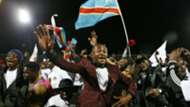
A diatribe from Kaizer Chiefs’ manager Gavin Hunt raised a tantalizing question: how would the Catalans fare if they had to play in Africa?
In the wake of his side’s creditable 1-0 home win over Wydad Casablanca in the Caf Champions League Group Stage, Kaizer Chiefs’ manager Gavin Hunt took aim at a number of perceived injustices.
In fairness, his grievances were not entirely without basis. Over the course of the 90’, he had seen his side reduced to nine men, and his side had to weather not just the numerical disadvantage, but more than a little embellishment from the Moroccan visitors.
Ultimately, Bernard Parker’s first-half goal proved sufficient to hand Amakhosi a lifeline in their bid for progression, one which they would take on the final matchday.
His diatribe took in the performance of the officials, as well as the “disappointing” gamesmanship that, in his view, defines African club football. “I’ve always said even Barcelona would struggle in Africa, because it’s tough,” he was quoted as saying by the Sowetan.
It was a peculiar claim, to be sure, and perhaps the most perceptive read would be to consider it a ham-fisted attempt at self-glorification. If even the Spanish and European giants could be expected to find the going difficult, then surely that would make Hunt’s work come across all the more impressively, considering the chasm in resources and profile.
However, beyond that admittedly cynical interpretation, what if one were to take the 56-year-old’s words at face value? Would Barcelona really struggle with playing on the African continent, with its attendant foibles and vagaries?

The problems that come with African club competition are undeniable.
Logistical concerns, poor playing surfaces, fan intimidation and (threat of) violence, sub-optimal officiating, behind-the-scenes politics, and a negligent attitude toward player welfare all combine to fuel the heady tragicomedy that characterizes Caf’s competitions.
It is an undesirable state of affairs, to be sure, and Caf have found addressing these concerns to be a Herculean labour. However, in a twisted sort of way, it is part of its charm: the tales of triumph are all the more colourful, the satisfaction is that much deeper.
So, how would transplanting Los Cules into this maelstrom pan out?
For the purposes of this hypothetical (and especially considering the tone of Hunt’s statement), we will assume a platonic Barcelona ideal, not tethered to a specific season or the present day, but spanning all their great teams from the appointment of Pep Guardiola onward.

Well, the only way to evaluate how the Catalan side would fare under these circumstances would be to look back on how they have handled similar scenarios. The sample size is not great, but going back over a decade – specifically the 2009/10 season – provides a famous example.
In March 2010, the Icelandic volcano Eyjafjallajokull erupted over Europe’s airspace, shutting down air travel and disrupting Barcelona’s travel plans for their Uefa Champions League semi-final first leg against Italian champions Internazionale.
As a result, Guardiola’s charges were forced to travel via bus to Milan to face Jose Mourinho’s side, and they arrived considerably fatigued. That logistical snafu proved the edge the Nerazurri needed to level the playing field, and despite the leggy visitors taking the lead, Inter roared back to win 3-1 and plant one foot firmly in the Final.
Proof positive then that, burdened with some of the same concerns that routinely plague African football, Barcelona would fall apart? Well, not so fast.

To conclude that would be to miss the point: while traveling by road no doubt impaired them, they still went ahead against Inter.
They still largely dominated possession. They still lost to the Italian champions, led by one of football’s most successful managers in history. Sure, they were sizeable favourites, but it merely knocked the wind out of them; their opponents still needed the quality to strike the knockout blow.
Other factors, much as they are more prevalent, are not exactly peculiar to African football.
European teams have been known to wilfully sabotage their own playing surfaces at the prospect of a Barcelona visit, growing it long in a bid to penalize their famous passing game – a noteworthy example in 2012 saw AC Milan nick a draw at San Siro by deliberately leaving their lawn untended.
Barcelona have also suffered extreme physical treatment at the hands of opponents, and have come through ties against teams that employed a great deal of gamesmanship.

The one specific banana peel they probably have not had to face is the weaponization of the weather; with climactic conditions varying wildly on the African continent, home sides will often select the most temperate times of day for their visitors in order to sap their energy reserves more quickly.
However, it is worth noting that this strategy, often employed against North African sides, has yet to significantly alter the competitive dynamic of Caf club football.
At the end of the day, the single biggest influence on footballing results remains the overall quality of players available.
If, for the sake of this hypothetical, one can assume Los Cules would keep their financial advantages, then they would still be better equipped than most sides on the continent to cushion the effect of those inconveniences.
It is no coincidence, after all, that Africa’s most successful club sides – the likes of Al Ahly and Zamalek – are also its wealthiest. Cream rises to the top, and nowhere is that better illustrated than in football.

Be the first to comment